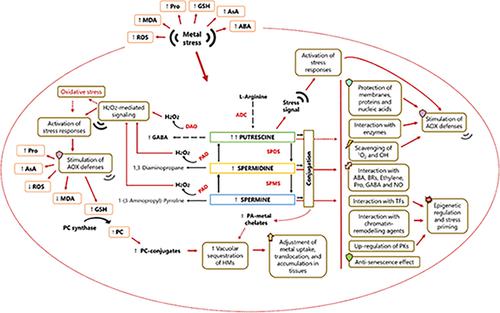当前位置:
X-MOL 学术
›
Ann. Appl. Biol.
›
论文详情
Our official English website, www.x-mol.net, welcomes your
feedback! (Note: you will need to create a separate account there.)
Polyamines as key regulatory players in plants under metal stress—A way for an enhanced tolerance
Annals of Applied Biology ( IF 2.2 ) Pub Date : 2020-10-21 , DOI: 10.1111/aab.12660 Sofia Spormann 1 , Cristiano Soares 1 , Jorge Teixeira 1 , Fernanda Fidalgo 1
Annals of Applied Biology ( IF 2.2 ) Pub Date : 2020-10-21 , DOI: 10.1111/aab.12660 Sofia Spormann 1 , Cristiano Soares 1 , Jorge Teixeira 1 , Fernanda Fidalgo 1
Affiliation

|
Polyamine (PA) metabolism and functions have started to raise attention from plant scientists in the last years. PAs have been investigated for their involvement in plant cell signalling and protection, proving that alterations in their endogenous levels can affect plant growth, development and survival. The recognised roles of PAs in metal‐stressed plants are presented and discussed on a “case‐study” basis, for each metal. Bearing in mind that the contamination of soils by heavy metals (HMs) is a growing problem worldwide, it is important to find efficient mechanisms through which agricultural productivity and food quality are safeguarded in a scenario of increased pollution. Making cultivars more tolerant to HM‐stress, capable of detoxifying or accumulating them safely, is a goal that will most certainly benefit from researching the functions and applicability of PAs. To date, plant PAs have been recognised for their roles as membrane‐, protein‐ and nucleic acid‐stabilisers, as protectors of cellular integrity and photosynthetic machinery, as direct and indirect signalling agents, and as emerging members of the non‐enzymatic antioxidant system. Moreover, PAs are not only important in normal plant developmental processes but have also been suggested to induce stress priming, to act as epigenetic regulators of gene expression and to enhance the detoxification and vacuolar compartmentalization of HMs. Although the stress‐ameliorating effects of PAs have been widely studied for several abiotic stresses, not much is known regarding their effects on metal induced‐stress, except for Cd. This review summarises the available work on the effects of PAs in plants exposed to Cu, Cd, Fe, Mn, Cr, Ni, Hg, Al, Pb and Zn.
中文翻译:

多胺是植物在金属胁迫下的关键调节剂-一种提高耐受性的方法
近年来,多胺(PA)的代谢和功能已开始引起植物科学家的关注。已对PA参与植物细胞信号传导和保护进行了研究,证明PA的内源性水平改变会影响植物的生长,发育和存活。针对每种金属,在“案例研究”的基础上介绍和讨论了PA在金属胁迫植物中的公认作用。考虑到重金属(HMs)对土壤的污染在世界范围内正在成为一个日益严重的问题,在污染加剧的情况下,找到有效的机制来保护农业生产率和食品质量至关重要,这一点很重要。使栽培品种对重金属胁迫具有更强的耐受力,能够安全地排毒或积聚它们,研究PA的功能和适用性无疑是一个必将受益的目标。迄今为止,植物PA已被公认为具有膜,蛋白质和核酸稳定剂,细胞完整性和光合作用保护剂,直接和间接信号传导剂以及非酶抗氧化剂系统的新兴成员等作用。 。此外,PAs不仅在正常植物发育过程中很重要,而且还被认为可以诱导胁迫启动,充当基因表达的表观遗传调节剂并增强HMs的解毒和液泡区室化。尽管已经针对多种非生物胁迫对PA的缓解应力作用进行了广泛研究,但除Cd以外,对PAs对金属诱导应力的作用了解甚少。
更新日期:2020-10-21
中文翻译:

多胺是植物在金属胁迫下的关键调节剂-一种提高耐受性的方法
近年来,多胺(PA)的代谢和功能已开始引起植物科学家的关注。已对PA参与植物细胞信号传导和保护进行了研究,证明PA的内源性水平改变会影响植物的生长,发育和存活。针对每种金属,在“案例研究”的基础上介绍和讨论了PA在金属胁迫植物中的公认作用。考虑到重金属(HMs)对土壤的污染在世界范围内正在成为一个日益严重的问题,在污染加剧的情况下,找到有效的机制来保护农业生产率和食品质量至关重要,这一点很重要。使栽培品种对重金属胁迫具有更强的耐受力,能够安全地排毒或积聚它们,研究PA的功能和适用性无疑是一个必将受益的目标。迄今为止,植物PA已被公认为具有膜,蛋白质和核酸稳定剂,细胞完整性和光合作用保护剂,直接和间接信号传导剂以及非酶抗氧化剂系统的新兴成员等作用。 。此外,PAs不仅在正常植物发育过程中很重要,而且还被认为可以诱导胁迫启动,充当基因表达的表观遗传调节剂并增强HMs的解毒和液泡区室化。尽管已经针对多种非生物胁迫对PA的缓解应力作用进行了广泛研究,但除Cd以外,对PAs对金属诱导应力的作用了解甚少。











































 京公网安备 11010802027423号
京公网安备 11010802027423号